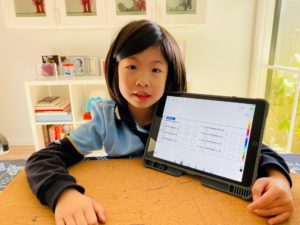Principal Update – The opportunity to view through a new lens

I appreciate one of the interesting observations of being in lockdown is the opportunity to view through a new lens how much-loved family members engage in their own work environments. Circulating through social media channels recently was the following jibes:
“Hearing my partner in full work mode for the first time. I realised… I’m married to a “let’s circle back” guy – who knew?”
“I remember the day I realised my partner was the “one more question” person at the end of meetings. I was somewhat surprised?”
“My partner is pleasant and patient on the phone. It’s like an invasion of body snatchers. I know them as the person who can’t sit still at the red lights. Why can’t I have the patient guy?”
Better still is the opportunity to hear your children interact with their teachers, responding to questions with enthusiasm or simply adding their own viewpoint to the discussions in the online classroom. I recall an enjoyable conversation with Barbreck parents last year following the winter lockdown when they expressed to me: “I never realised how much French she could speak until I heard her in the online class”.
In my conversations with teachers this week, I am reminded of how much time is required to prepare lessons for online delivery. A teacher’s lesson preparation is certainly hidden from view to the student learning online but nonetheless, significant consultation with teaching colleagues about methodology, intent, cross marking and building resources occurs as an everyday occurrence in our staffrooms or Staff MS Teams Channels, as per this week.
Whilst curriculum intentions and lesson objectives have not changed, the varied mode of delivery often requires the preparation of different learning materials or the sequence of tasks to be altered. With the extension of the lockdown announced yesterday, teachers in the Senior School are currently reviewing the assessment instruments to be undertaken next week by the Senior School cohorts with a recheck on length and suitability for the remote classroom.
A key focus at St Catherine’s this year is our ‘Teaching 4 Thinking’ agenda. This is specifically designed to engender a deep understanding of the curriculum, that being the ability to connect prior knowledge, to put knowledge in context, to see the big picture – to understand it deeply. It is undoubtedly, one of the fun parts of learning, as developing a deep understanding requires engagement and curiosity. The reward of deep understanding is a feeling of fulfilment and satisfaction.
According to academic John Hattie, deep understanding flows out of ‘surface knowledge’ and is required before meaningful critical thinking can be practised. It is an important step on the road to self-directed, higher-order thinking and learning.
At St Catherine’s, we have worked against the trend of an inch deep, mile wide curriculum for three years now. A focus on developing thinking skills, thus avoiding ‘busy work’ or rote learning of material that is spoon fed by the teacher.
This week, parents are in the privileged position to encourage children to engage with their school work in a meaningful way, encouraging them to become lifelong learners. It requires innovation, patience, critical thinking and allowing children to have meaningful opportunities with deep understanding at the heart of the intention.
Here are three ways to promote deep understanding on the home front for Barbreck parents:
- Let them research and pursue their own ideas, and make their own mistakes. Ask lots of questions, and let your child do the answering, always allowing for ‘pop-up’ questions, as this is when the good learning happens.
- Spend time reading together, and interacting outside together. Deep understanding requires heightened curiosity and having the thinking skills to critically question why things happened, and the ability to research and find possible solutions. Increasing reading efficiency will allow children to extract more from the text and spend more time in the deep-level thinking zone, developing a deep understanding of the topic.
- Giving your child much needed downtime will provide brain space to process the information of the day, and generate those deep-level thinking questions. Be mindful of allowing your child the opportunity to reflect on their different experiences. Encourage this by asking open questions (not an interrogation!) in a way that is natural and elicits a discussion.
In the Senior School, parents will be advised of the assessment schedule for next week through correspondence by each Head of Year. Your cooperation with ensuring the following is greatly appreciated:
- Assisting your daughter in setting up of a quiet space for the exam.
- Ensuring your daughter is ‘okay’ during exam.
- Details on the protocols and authentication will be explained to parents via the Heads of Year, as parents are effectively present and supervising in the physical space.
- Any wellbeing concerns should be promptly communicated to each Head of Year.
We have enjoyed welcoming the return of Years 11 and 12 to campus today. Shortly following the circulation of my parent correspondence on Wednesday of this week, VCAA advised the GAT scheduled for Wednesday 9 June, will be re-scheduled on a date still to be advised. Indeed, this is yet again, another example of the agility and flexibility required of our students and staff at the moment.
Menzies Foundation Fellowship
Following a lengthy application completed together with Miss Kristy Forrest, and a somewhat gruelling hour-long interview with a panel of five, I was thrilled to be selected as one of five recipients of a Menzies Foundation Fellowship offered to schools in Victoria. This will be undertaken over two years and is worth in the vicinity of $150k, which I will be able to share across staff to facilitate two key programs: Teaching for Thinking Agenda and the Senior Years Learning Model with Independent Learning Tutorials incorporating the Flexi-Tutes and Masterclasses.
The Menzies Fellowship directly recognises the work we are undertaking in the School to create a thinking culture and to improve the independence, agency and resilience of our students. Both the Teaching for Thinking and the Independent Learning Tutorials featured in the application and had significant appeal to the Menzies Foundation Fellowship Panel, as both heavily incorporate the collective efficacy across our staff to implement successfully within the School. This is a wonderful endorsement of our initiatives and the work of Miss Forrest and Mrs Ceri Lloyd in establishing these programs. We will be asked to leverage these programs and showcase our endeavours broadly as a leading example of contemporary school practice.
For more information about the Menzies Foundation.
Today, we farewell Mathematics Faculty teacher, Andrew Delfinis, and thank him for the valuable contribution to St Catherine’s School. Andrew has been an active participant in the Student Programs, enjoyed School Camps with the girls and also managed the day-to-day operational aspects of the school. I wish Andrew the very best with working at Xavier College.
The School welcomes, Ms Jessica Basa, to the Mathematics Faculty commencing in Term 3. Jessica has most recently been teaching Methods and Specialist Mathematics at St Margaret’s & Berwick Grammar School, and prior to this was teaching in the UK.
Best wishes for the week ahead.


